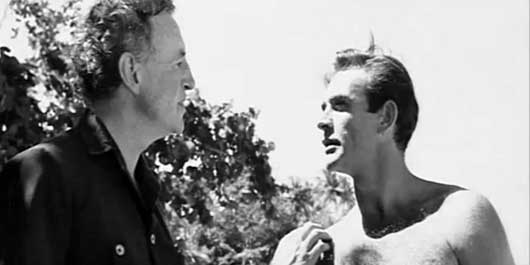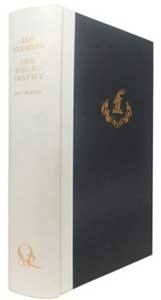
On the 50th anniversary of the release of the first James Bond film (which comes on October 6th), many fans would assume Ian Fleming considered his life and work was a success, but that’s not quite the case, claims his biographer Jon Gilbert. Fleming may have been a good sportsman, a talented naval intelligence officer during the war and an admired writer but he was always in the shadow of his brother Peter, says Gilbert.
“Peter was a great athlete and explorer, and an excellent travel writer explains Gilbert, “and he wrote books in the 1930s when there weren’t any travel books. So in many ways Ian was always in the shadow of his brother, but you can see the seeds of what made him a writer too the sense of adventure, the sporting prowess.
Ian Fleming deserves a biography, especially in this 50th anniversary of his greatest creation, James Bond. Fleming’s life was in many ways more extraordinary than Bond’s he was educated in Geneva and Austria, he spoke four languages, he loved learning to scuba dive, and he was very well connected to many writers and publishers. His father’s obituary was written by none other than Winston Churchill, and Fleming kept a framed copy wherever he went. He also sat opposite Churchill during the war, and wrote for Reuters. And contrary to popular opinion he wasn’t an Eton-educated snob, he was actually in awe of writers who were held in higher esteem than himself Somerset Maugham, Graham Greene, Evelyn Waugh, Stephen Spender.
Fleming was under-rated as a writer Gilbert thinks: “When Casino Royale was first published it wasn’t slated but it was considered alongside thriller writers. Somerset Maugham who wrote the Ashburn series of spy books, which could have inspired James Bond read it and liked it, but didn’t review it publicly because they were friends.
Casino Royale wasn’t an instant success either: “It sold ok but it was a slow start. It wasn’t until the book was serialised in the Express, then the biggest paper of the day, that it started to take off and the books started to really sell. Then there was the first film, Dr. No, with Sean Connery that really took off.
Ah yes, the Connery question. Film history seems to record that Fleming didn’t like Connery as his character but Gilbert reveals: “There is absolutely no evidence of that at all. He kept notebooks, and he visited the set the beach where Ursula Andress comes out of the water was near his home and there is nothing to say he disapproved of Connery.
In the US Fleming had another piece of good fortune President Kennedy did an interview where he was asked to name his top 10 books From Russia With Love was number nine. Gilbert says: “Kennedy was seen as very cool, so to have that endorsement was massive.
Fleming only lived long enough to see two of his Bond books turned into films, but was happy with them says Gilbert: “I think he was very flattered at all the attention, and of course they made him a lot of money. “
Of course it wasn’t just Bond books that were made into films: “He was ill in 1961 with heart trouble, and while he was recovering he wrote down the stories he told his son when he was a boy. They turned into Chitty Chitty Bang Bang. That was turned into a film with a script by Roald Dahl, who knew Fleming from during the war. Dahl was a natural choice to bring out the darker sides of the story the child catcher is pure Dahl. But Dahl was a pilot during the war so they had that connection.
An hour in Gilbert’s company is enough to completely change your view of Fleming he was not the martini-drinking snob who hated modernism (he admittedly hated a famous house in Hampstead so much he used the architect’s name for his baddie Goldfinger) but was a fun-loving, happy-go-lucky person who certainly lived life to the full.
 Gilbert adds: “He had a travel job for the Sunday Times which he used to put his experiences in his books. For example he asked listeners to tell him where buried treasure was and he went out to scuba dive the places to see if it was true. He never found anything but you can see the use of buried treasure in his books.
Gilbert adds: “He had a travel job for the Sunday Times which he used to put his experiences in his books. For example he asked listeners to tell him where buried treasure was and he went out to scuba dive the places to see if it was true. He never found anything but you can see the use of buried treasure in his books.
In fact everything in Fleming’s life reappeared as Bond: “The war gave him all the stories he needed, and he had an interest in cars, and adventures. It’s all there.
Bond had one advantage over Fleming though: “He was immortal.
Ian Fleming: The Bibliography by Jon Gilbert is released by Queen Ann Press for £250 and £175.